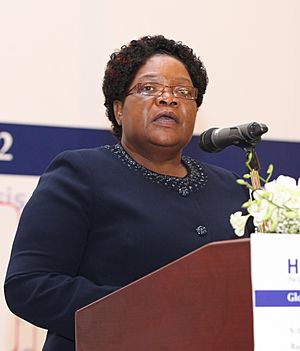Joice Mujuru facts for kids
Quick facts for kids
Joice Mujuru
|
|
|---|---|

Mujuru in 2012
|
|
| First Vice-President of Zimbabwe | |
| In office 6 December 2004 – 8 December 2014 |
|
| President | Robert Mugabe |
| Preceded by | Simon Muzenda |
| Succeeded by | Emmerson Mnangagwa |
| President of the National People's Party | |
| Assumed office 2017 |
|
| Preceded by | Party established |
| Vice-President and Second Secretary of ZANU-PF | |
| In office 6 December 2004 – 8 December 2014 |
|
| President | Robert Mugabe |
| Preceded by | Simon Muzenda |
| Succeeded by | Emmerson Mnangagwa |
| Secretary of the ZANU–PF Women's League | |
| In office 1981–1988 |
|
| Preceded by | Sally Mugabe |
| Succeeded by | Tsungirirai Hungwe |
| Personal details | |
| Born |
Runaida Mugari
15 April 1955 Mount Darwin, Southern Rhodesia (now Zimbabwe) |
| Political party | National People's Party (since 2017) Zimbabwe People First (2016–17) ZANU–PF (until 2015) |
| Spouse | |
| Children | 4 |
| Alma mater | Women's University in Africa |
| Nickname | Teurai Ropa |
| Military service | |
| Allegiance | Zimbabwe African National Liberation Army |
| Years of service | 1972–1979 |
| Rank | Commissar |
| Commands | Second-in-Command of Zhunta Camp |
| Battles/wars | Rhodesian Bush War |
Joice Runaida Mujuru (born 15 April 1955), also known by her war name Teurai Ropa Nhongo, is a Zimbabwean politician. She served as the Vice-President of Zimbabwe from 2004 to 2014. Before that, she was a government minister and a leader in the ZANU–PF political party. She was married to Solomon Mujuru until he passed away in 2011. Joice Mujuru was once seen as a possible future leader of Zimbabwe. However, in 2014, she faced accusations and lost her role as Vice-President and her position in the party. She later started a new political party called Zimbabwe People First.
Contents
Early Life and War Heroism
Runaida Mugari was born in Mount Darwin, a district in northeastern Zimbabwe. She belongs to the Shona group, specifically the Korekore language speakers. She went to a Salvation Army school called Howard High.
At 18, Joice Mujuru decided to join the Rhodesian Bush War, a fight for Zimbabwe's independence. She was the only woman who trained in Lusaka at that time. She became known by her war name, Teurai Ropa Nhongo, which means "spill blood" in the Shona language. She quickly became one of the first female commanders in the ZANLA forces, which were fighting for independence.
In 1977, she married Solomon Mujuru, who was also a high-ranking commander. In the same year, she became the youngest member of the ZANU Central Committee, a very important political group. She was actively involved in the war, even when she was nine months pregnant in 1978. She gave birth just a few days later.
After the war, people knew her by her adopted name, Joice. Her mother later shared that her real birth name was Runaida, named after her late aunt. Today, the Mujuru family lives on a large farm called Alamein Farm, about 45 miles (72 km) south of Harare.
Political Career in Zimbabwe
After Zimbabwe gained independence in 1980, Joice Mujuru became the youngest cabinet minister. She was in charge of sports, youth, and recreation. Even with her busy schedule as a minister, she continued her secondary school education.
As the Minister of Telecommunications, she was involved in decisions about phone networks in the country.
Becoming Vice-President
In 2004, the ZANU-PF Women's League decided that a woman should become the party's Vice-President. This position was open after the death of Simon Muzenda.
President Robert Mugabe agreed to this idea, partly due to pressure from a group within ZANU-PF led by Joice Mujuru's husband, General Solomon Mujuru. This decision meant that Emmerson Mnangagwa, who many thought would be the next Vice-President, was not chosen at that time.
Joice Mujuru was sworn in as the First Vice-President of Zimbabwe on 6 December 2004. She was the first woman to hold this high office in Zimbabwe.
In the March 2008 parliamentary election, Mujuru was a candidate for the House of Assembly seat for Mt. Darwin West. She won the seat by a large number of votes. After the election, she was sworn in again as Vice-President on 13 October 2008.
Leaving the Party and Forming New Ones
In late 2014, there were disagreements within the ZANU-PF party, and Joice Mujuru left the party. She lost her leadership roles at the December 2014 party meeting. Soon after, on 8 December 2014, President Mugabe removed her from her position as Vice-President. She stated that the claims against her were "ridiculous."
On 10 December 2014, Emmerson Mnangagwa, who had been her rival for the Vice-Presidency, was appointed to replace her.
Joice Mujuru was officially removed from ZANU-PF on 3 April 2015. After this, she went on to form a new political party called Zimbabwe People First. In 2017, she changed the name of her party to the National People's Party after some members left.
Before the 2018 Presidential election, Joice Mujuru signed an agreement with 20 smaller political parties to work together. She was one of 23 candidates who ran for President in that election.
Important Roles Held
- Minister of Community Development and Women's Affairs (1980–1985)
- Minister of State in the Prime Minister's Office (1985–1988)
- Minister of Community Development, Cooperatives and Women's Affairs (1988–1992)
- Resident Minister and Governor for Mashonaland Central (1992–1996)
- Minister of Information, Post and Telecommunication (1996–1997)
- Minister of Rural Resources and Water Development (1997–2004)
- First Vice-President of Zimbabwe (2004–2014)
 | Laphonza Butler |
 | Daisy Bates |
 | Elizabeth Piper Ensley |

